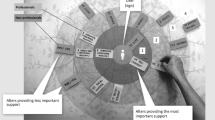Abstract
The general importance of an individual's support network has been recognized in the field of community mental health; yet a more detailed understanding of how a client's available social ties may contribute to his or her adjustment is presently lacking. This study used network analysis to examine differences in the social networks of mental health clients to identify factors associated with positive social adjustment. Subjects were selected from three different types of mental health programs as well as from the general population of Marion County, Oregon. Results generally revealed that subjects from the community sample more often would look to immediate family members for support. Better functioning chronic clients emphasized professional contacts, whereas more poorly adjusted chronic clients would look to friends for support. The results have implications both for understanding the nature of the support available to a client and mobilizing the support resources of the existing network of relationships to aid adjustment to community living.
Similar content being viewed by others
References
Boissevain, J., & Mitchell, J. C. (Eds.).Network analysis: Studies in human interaction. The Hague, Netherlands, Morton, 1973.
Ciarlo, J. A., & Reihman, J. The Denver community mental health questionnaire: Development of a multidimensional program evaluation instrument. In R. D. Coursev (Ed.),Program evaluation for mental health: Methods, strategies, and participants. New York: Grune & Stratton, 1978.
Collins, A., & Pancoast, D.Natural helping systems. Washington, D.C.; National Association of Social Workers, 1976.
Erickson, G. D. The concept of personal networks in clinical practice.Family Process, 487–498, 1975.
Fischer, C. S.Networks and places. New York: Free Press, 1977.
Froland, C.Analyzing social networks: Implications for the health professions. Unpublished paper, University of California, Berkeley, 1976.
Froland, C.Improving the social adjustment of mental health clients: The case for social support networks. Doctoral dissertation, School of Public Health, University of California, Berkeiey, 1978.
Kaplan, B. H., Cassel, J. C., & Gove, J. Social support and health.Medical Care, 1977,15(5) 47–50 (Supplement).
Kreissman, D., & Joy, V. Family responses to the mental illness of a relative: A review of the literature.Schizophrenia Bulletin, 1974,10, 34–57.
McKinlay, J. B. Social networks, lay consultation and help-seeking behavior.Social Forces, 1973,51, 275–292.
O'Brien, J.Designing the balanced service system: A partial review of the literature. Atlanta, Ga.: Georgia Mental Health Institute, 1977.
Pilisuk, M., & Froland, C. Social networks, kinship, social support and health.Social Science and Medicine. In press.
President's commission on Mental Health.Report of the task panel on community support system. (Vol. II, App.) Washington D.C.: U.S. Government Printing Office, 1978.
Reihman, J., Brodsky, G., & Adams, G.Standardization of the Denver community mental health questionnaire in Oregon. Salem, Oreg. Oregon Mental Health Division, Management Support Services, 1977.
Schon, D.Network related intervention. Paper commissioned by the School Capacity for Problem Solving Group. Washington, D.C.: National Institute of Education, 1977.
Speck, R., & Attneave, G.Family networks. New York: Pantheon, 1973.
Tolsdorf, C.: Social networks, support and coping: An exploratory study.Family Process, 1976,4, 407–418.
Van De Geer, J.Multivariate analysis for the social sciences. San Francisco: Freeman, 1971.
Walker, K., MacBride, A., & Vachon, M. Social support networks and the crisis of bereavement.Social Science and Medicine, 1977,11, 35–41.
Weissman, M. Assessment of social adjustment.Archives of General Psychiatry, 1975,32, 357–365.
Additional information
The authors, affiliated with the Oregon Mental Health Division, would like to acknowledge the help of the following people: Dr. Al Sheff, Clinical Director, Oregon State Hospital (OSH); Donna Clark, R. N., B. S. N., Nursing Day Supervisor, Oregon State Hospital; the ward staff at OSH: Ruth Shirley, Ph.D., R.N., Director of Marion County Community Mental Health Program; Luce LeFleur, M.P.S., Supervisor of Screening Crisis Marion County Community Mental Health Program; Dave Drummond, Ph.D., Clinical Supervisor Marion County Day Treatment Program; Corinne Nygaard, Program Secretary; Jess Armas, MSW, Director of the Community Counseling Center in Salem, Oregon, and his staff; and Barry Kast, MSW, Program Manager for Day Treatment, Benton County Mental Health, and his staff. Without their generous help, this study would not have been possible. Special thanks if given to Jeanne Robinson, our efficient and tireless interviewer.
Rights and permissions
About this article
Cite this article
Froland, C., Brodsky, G., Olson, M. et al. Social support and social adjustment: Implications for mental health professionals. Community Ment Health J 15, 82–93 (1979). https://doi.org/10.1007/BF00757330
Issue Date:
DOI: https://doi.org/10.1007/BF00757330




